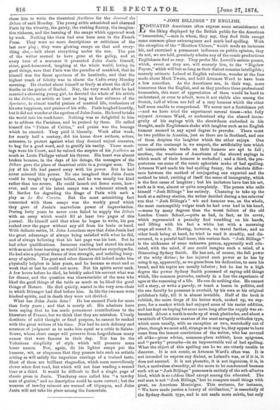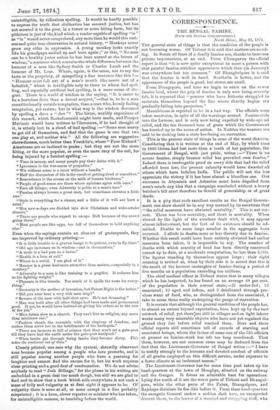"JOSH BILLINGS " IN ENGLISH.
EDUCATED Americans often express some astonishment at the liking displayed by the British public for the American " humourists,"—men in whom, they say, they find little except some common-place extravagance and much bad spelling. With the exception of the " Heathen Chinee," which made an immense bit, and exercised a permanent influence on public opinion, they do not, we are told, genuinely admire any of the comic productions Englishmen find so racy. They prefer Mr. Lowell's serious poems, which, sweet as they are, will scarcely live, to the "Bigelow Papers," which will last as long as their dialect remains intelligible ; scarcely estimate Leland at English valuation, wonder at the fuss made about Mark Twain, and hold Artemus Ward to have been a low comedian. As the Americans are, in their way, more humorous than the English, and as they produce these professional humourists, this want of appreciation of them would be hard to understand, or even to admit, were it not visible also among the Scotch, half of whom are full of a racy humour which the other half seem unable to comprehend. We never met a Scotchman yet —and we have tried the experiment several times—who fully enjoyed Artemus Ward, or understood why the absurd incon- gruity of his sayings with the shrewdness embodied in his thought, made Englishmen shake with laughter such as no English humour seemed in any equal degree to provoke. There must be two publics in America, just as there are in Scotland, and one of them despises the laughter which the other enjoys. One cause of the contempt is, we suspect, the artificiality into which all humourists who trade on their humour are apt to fall ; another, the weariness of Americans of the shrewd sayings in which much of their humour is embodied ; and a third, the pre- posterous use some of the comic aphorists make of bad spelling. Artemus Ward made his bad spelling funny, the absolute differ- ence between the method of conjugating one expected and the method he tried, exciting of itself the sense of incongruity, which is the first cause of laughter ; but his imitators have lost his art, such as it was, almost or quite completely. The person who calls himself "Josh Billings" has entirely. Chancing to take up the book at a railway-station, the writer decided during a ten minutes' run that " Josh Billings's " wit and humour was, on the whole, the most contemptibly vulgar trash he had ever had in his hand, —worse by many degrees than the worst failure of the old London Comic School,—quite as bad, in fact,- as its cover, which represented a paunchy fool tumbling on his hands, and lifting with his feet a white hat with a mourning crape all round it. Having, however, to travel farther, and no other book being at hand, he tried to read it steadily, and dis- covered, in a painful half-hour, this curious fact. "Josh Billings" is the nickname of some unknown person, apparently well edu- cated, with the mind, if one could imagine such a mind, of a Dissenting Sydney Smith. He has not, of course, the full power of the witty divine ; he has injured such power as he has by using it up, apparently, as we guess from his dedication, to earn his bread, and his topics are usually inferior ; but he has in a high degree the power Sydney Smith possessed of saying odd things which, like common proverbs, embody in a line the experience of ages or the reasoning of a life. He can do nothing else. He cannot tell a story, or write a parody, or teach a lesson in politics, and the one faculty he possesses is overlaid, by his own or his original publisher's folly, till it is almost invisible. Half of the book is rubbish, the mere dregs of his better work, cooked up, we sup- pose, for a market which had enjoyed some of his racier oddities, and has kept on hoping for some more long after the supply was ex- hausted. About a tenth is made up of weak platitudes, and about a twentieth of Christian maxims of the most savagely orthodox type, which seem usually, with an exception or two, wretchedly out of place, though we must add, strange as it may be, they appear to have come from the inmost convictions of the writer, who has covered all alike—pious advice, common-place rubbish, keen epigrams, and " pawky" proverbs—in an impenetrable veil of bad spelling. What the object of this spelling can be we are utterly unable to discover. It is not comic, as Artemus Ward's often was. It is not intended to express any dialect, as Leland's was, or if it is, it does not succeed. It is not phonetic, it is not ingenious, it is, in fact, a motiveless absurdity, all the more to be condemned because such wit as " Josh Billings" possesses is entirely of the sub-allusive kind, which is so seldom liked except among the educated. The real man is not "Josh Billings," but to compare small things with great, an American Montaigne. This sentence, for instance, " We have made justice a luxury of civilisation," is essentially of the Sydney-Smith type, and is not made more subtle, but only
unintelligible, by ridiculous spelling. It would be hardly possible to express the truth that civilisation has secured justice, but has not secured it to the poor, in a terser or more biting form, but its pithiness is just of the,kind which a reader capable of spelling "is" as "iz " would never comprehend, any more than he would this curi- ous and quite true observation in natural history, " Monkeys never grow any older in expression. A young monkey looks exactly like his grandpapa melted up and born again ;" or this, " No man can be a healthy jester unless he has been nursed at the breast of wisdom," a sentence which contains the whole difference between the humour of a man like Sydney Smith or Charles Lamb and the humour of Mr. Lear. Where, again, is the sense, not to say the taste or the propriety, of misspelling a fine sentence like this ?
4‘ Humour must fall out of a man's mouth like music out of a bobolink," which is intelligible only to those to whom bad spel- ling, and especially artificial bad spelling, is a mere cause of dis- gust. There is a world of wisdom in the saying, "It is easier to
be a harmless dove than a decent serpent,"—that is, to be a man constitutionally outside temptation, than a man who, keenly feeling temptation, yet resists; but in what way is the wisdom flavoured by spelling a dove a " duv "? The bitter, worldly experience of this remark, which Rochefoucauld might have made, and Prosper Merimee would have written to l'Inconnue, if he had thought of it, is utterly lost in a cloud of bad spelling :—" Some men marry to get rid of themselves, and find that the game is one that two can play at, and neither win." All the following are suggestive ahrewdnesses, much better than Franklin's, whose "Poor Richard" .Americans are so inclined to praise ; but they are not the more biting, or the more popular, or even the more racy of the soil, for being injured by a farcical spelling :—
" Time is money, and many people pay their debts with it." " Ignorance is the wet-nurse of prejudice."
-"Wit without sense is a razor without a handle."
-"Half the discomfort of life is the result of getting tired of ourselves." "Benevolence is the cream on the milk of human kindness." 4g People of good-sense are those whose opinions agree with ours." "Face all things; even Adversity is polite to a man's face." "Passion always lowers a great man, but sometimes elevates a little one."
"Style is everything for a sinner, and a little of it will not hurt a saint."
"Men now-a-days are divided into slow Christians and wide-awake sinners."
"There are people who expect to escape Hell because of the crowd going there."
"Most people are like eggs, too full of themselves to hold anything else."
Even when the sayings contain an element of grotesquerie, they are improved by ordinary printing:— "It is little trouble to a graven image to be patient, oven in fly-time." 4' Old age increases us in wisdom—and in rheumatism."
4'A mule is a bad pun on a horse."
-"Health is a loan at call."
"Wheat is a serial. I am glad of it."
"Manner is a great deal more attractive than matter,—especially in a monkey."
"Adversity to a man is like training to a pugilist. It reduces him 'to his fighting weight."
"Pleasure is like treacle. Too much of it spoils the taste for every- thing."
"Necessity is the mother of invention, but Patent Right is the father." "Did you ever hear a very rich man sing?"
-"Beware of the man with half-shut eyes. He's not dreaming."
"Man was built after all other things had been made and pronounced good. If not, he would have insisted on giving his orders as to the rest of the job."
"Mice fatten slow in a church. They can't live on religion, any more than ministers can."
"Fashion cheats the eccentric with the claptrap of freedom, and makes them serve her in the habiliments of the harlequin."
"There are farmers so full of science that they won't sot a gate-post CU they have had the earth under the gate-post analysed."
" When lambs get through being lambs they become sheep. This takes the sentiment out of them."
Clearly printed, one sees why the cynical, shrewdly observant man became popular among a people who love proverbs, and is still popular among another people who have a yearning for laughter and cannot find the excuse for it, but his work requires clear printing and a good deal of condensation. We do not advise anybody to read "Josh Billings," for the plums in his writing are embedded in a great deal too much dough, but still we are glad to find and to show that a book Which sells everywhere is not such a mass of folly and vulgarity as at first sight it appears to be. Of vulgarity there is none at all, or none except in a line probably misprinted ; it is a keen, clever reporter or minister who has taken, for unintelligible reasons, to tumbling before the world.



































 Previous page
Previous page